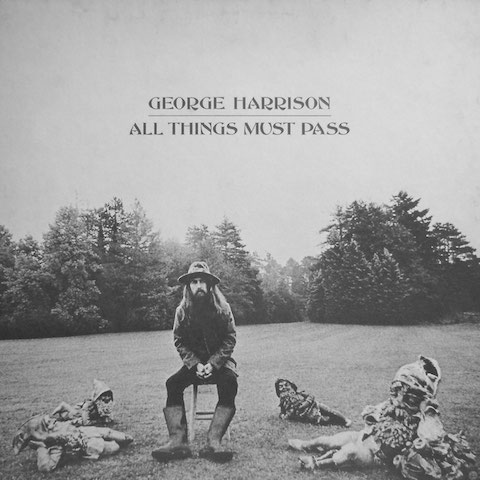
It’s pretty well established by this point that Phil Spector is dangerously insane. But once upon a time, he was also insane in the best possible way, willing to use methods no other record producer would to create his signature sixties “wall of sound” with huge ensembles and off-the-wall effects that turned the studio into an instrument. And for all his documented violence, Spector was also once a surprisingly gentle writer, as you can see in his notes to George Harrison, made during the recording of Harrison’s Spector-produced triple-album All Things Must Pass. In his comments, Spector coaxes Harrison to work harder on his vocal performances and make his voice more prominent throughout the album’s eighteen studio tracks.
Although he’d made significant contributions to The Beatles as a songwriter, Harrison was eager to do his own thing during the band’s demise in the late sixties. All Things Must Pass is generally thought of as his first solo album, but he had actually released two previous records under his name, the 1968 film soundtrack Wonderwall Music and the experimental 1969 Electronic Sound. Both of these, however, are largely instrumental, and Harrison had yet to step out of the The Beatles as a singer in his own right until All Things Must Pass in 1970. Spector’s notes make it clear that Harrison was less than confident in his vocal abilities. In the midst of his technical comments, Spector frequently refers to Harrison’s voice as “buried” in the mix. The letter as a whole is an intriguing glimpse into Spector’s process and, I think, a glimpse of Harrison working to overcome his natural reticence. After his list of notes on each track—some a sentence or two, some paragraph-length—Spector ends with a diplomatic summation that reiterates his desire to put Harrison’s voice front-and-center.
George, on all the 18 numbers I just mentioned, this is what I feel are the most important items on each. Naturally, wherever possible, of main importance is to get a good vocal performance by yourself. Also, if you do any of the background voices, you should spend considerable time on them to make sure they are good…. I think you should spend whatever time you are going to on performances so that they are the very best you can do and that will make the remixing of the album that much easier. I really feel that your voice has got to be heard throughout the album so that the greatness of the songs can really come through. We can’t cover you up too much (and there really is no need to) although as I said, I’m sure excellent mixes can be obtained with just the proper amount of time spent on each one.
The letter finishes on a very warm note:
George, thank you for all your understanding about what we discussed, I appreciate your concern very much and hope to see you as soon as it is possible.
Much love. Regards to everyone. Hare Krishna,
Phil Spector
Read the full letter here.
Related Content:
George Harrison in the Spotlight: The Dick Cavett Show (1971)
Here Comes The Sun: The Lost Guitar Solo by George Harrison
Ravi Shankar (RIP) Gives George Harrison a Sitar Lesson … and Other Vintage Footage
Josh Jones is a writer and musician based in Durham, NC. Follow him at @jdmagness


One of my favorite albums of all time. Nice to read some info about how this masterpiece was created.